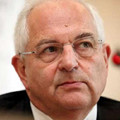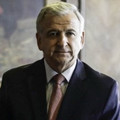Making the Case for Reform

IMF SEMINAR EVENT
DATE: October 18, 2019
DAY: Friday
1:00 PM - 2:00 PM
LOCATION: IMF HQ1, Meetings Halls A&B (HQ1-3-430 A&B)
VIDEO SUMMARY
Overview
IMF research shows that a major broad-based reform push in the areas of governance, trade, finance, and product and labor markets could raise output by as much as 7% over 6 years, providing a big boost to jobsJoin the conversation via #PoliciesForGrowth #StructuralReforms
Making the Case for Reform
While there is broad agreement on the economic benefits of structural reforms, they often carry short-term costs while most of the economic gains from reforms only materialize over the longer term. On this background, the panel discussed the political economy of reform and the challenges with implementing structural reforms.
KEY POINTS:
- Reform priorities. While panelists agreed that the goal is to achieve sustainable growth, there were different views on reform priorities. Alesina called for reforms to focus on labor market flexibility, trade liberalization, pensions, and social mobility, while Visentini underscored the need for reforms focused on social protection and wage inequality. As Pereira and Visentini noted, reforms should prepare the economy and society to challenges ahead. Donohoe highlighted that reform design is not neutral but reflect social values and political judgments.
- Reform implementation. Timing, allocation of benefits, as well as the public narrative are important considerations in reform implementation. Donohoe noted that the political and economic cycle matter, as the ability to make the case for reform are greater during economic booms. Larrain underscored the importance to present the benefits and the need for change in a constructive narrative. In this sense, Donohoe and Pereira, and Visentini emphasized the crucial role of social dialogue.
- Political-economy challenges. Panelists noted the challenges associated with the political process in approving reforms, highlighting possible electoral costs to the incumbent. Alesina stressed the problem with vested interests and lobbies blocking reform. Donohoe noted that the absence of political consensus may overwhelm the reform agenda. In this sense, reform implementation may call for a mix of legislation and regulation, as noted by Larrain.
Panelists
Moderator: Martin Wolf
 Martin Wolf is chief economics commentator at the Financial Times, London. He was awarded the CBE (Commander of the British Empire) in 2000 “for services to financial journalism”. Mr Wolf is an honorary fellow of Nuffield College, Oxford, honorary fellow of Corpus Christi College, Oxford University, an honorary fellow of the Oxford Institute for Economic Policy (Oxonia) and an honorary professor at the University of Nottingham. He has been a forum fellow at the annual meeting of the World Economic Forum in Davos since 1999. He was made a Doctor of Letters, honoris causa, by Nottingham University in July 2006. He was made a Doctor of Science (Economics) of London University, honoris causa, by the London School of Economics in December 2006. His most recent publications are Why Globalization Works and Fixing Global Finance.
Martin Wolf is chief economics commentator at the Financial Times, London. He was awarded the CBE (Commander of the British Empire) in 2000 “for services to financial journalism”. Mr Wolf is an honorary fellow of Nuffield College, Oxford, honorary fellow of Corpus Christi College, Oxford University, an honorary fellow of the Oxford Institute for Economic Policy (Oxonia) and an honorary professor at the University of Nottingham. He has been a forum fellow at the annual meeting of the World Economic Forum in Davos since 1999. He was made a Doctor of Letters, honoris causa, by Nottingham University in July 2006. He was made a Doctor of Science (Economics) of London University, honoris causa, by the London School of Economics in December 2006. His most recent publications are Why Globalization Works and Fixing Global Finance.
Opening Remarks: David Lipton
 David Lipton assumed the position of First Deputy Managing Director of the International Monetary Fund on September 1, 2011. On March 28, 2016, he was reappointed for a second five-year term beginning September 1, 2016. Before coming to the Fund, Mr. Lipton was Special Assistant to the President, and served as Senior Director for International Economic Affairs at the National Economic Council and National Security Council at the White House. Previously, he was a Managing Director at Citi, and also served in the Clinton administration as Under Secretary of the Treasury for International Affairs — and before that as Assistant Secretary. Mr. Lipton earned a Ph.D. and M.A. from Harvard University in 1982 and a B.A. from Wesleyan University in 1975.
David Lipton assumed the position of First Deputy Managing Director of the International Monetary Fund on September 1, 2011. On March 28, 2016, he was reappointed for a second five-year term beginning September 1, 2016. Before coming to the Fund, Mr. Lipton was Special Assistant to the President, and served as Senior Director for International Economic Affairs at the National Economic Council and National Security Council at the White House. Previously, he was a Managing Director at Citi, and also served in the Clinton administration as Under Secretary of the Treasury for International Affairs — and before that as Assistant Secretary. Mr. Lipton earned a Ph.D. and M.A. from Harvard University in 1982 and a B.A. from Wesleyan University in 1975.
Panelist: Alberto Alesina
 Alberto Alesina is the Nathaniel Rope Professor of Political Economy at Harvard University and visiting professor at IGIER Bocconi. He is a member of the American Academy of Arts and Sciences and of the Econometric Society. He is the director of the program in political economics at the NBER. He has been chairman of the Economic Department at Harvard and coeditor of the Quarterly Journal of Economics. He has published on all major economic journals and several columns in many major newspapers in including the Financial Times, and the Wall Street journal. He is a regular editorialist for Corriere Della Sera. His latest book is Austerity: when it works and when it doesn’t (Princeton University Press 2019)
Alberto Alesina is the Nathaniel Rope Professor of Political Economy at Harvard University and visiting professor at IGIER Bocconi. He is a member of the American Academy of Arts and Sciences and of the Econometric Society. He is the director of the program in political economics at the NBER. He has been chairman of the Economic Department at Harvard and coeditor of the Quarterly Journal of Economics. He has published on all major economic journals and several columns in many major newspapers in including the Financial Times, and the Wall Street journal. He is a regular editorialist for Corriere Della Sera. His latest book is Austerity: when it works and when it doesn’t (Princeton University Press 2019)
Panelist: Paschal Donohoe
 Paschal Donohoe is the Minister for Finance and the Minister for Public Expenditure and Reform of Ireland. He was appointed to these roles in June 2017. From May 2016 to June 2017, he served as the Minister for Public Expenditure and Reform, and from July 2014 to May 2016, as the Minister for Transport, Tourism and Sport. He also held the position of Minister for European Affairs at the Department of An Taoiseach and the Department of Foreign Affairs from July 2013 to July 2014. Minister Donohoe is a graduate of the Trinity College Dublin, with a degree in Politics and Economics and he attended St. Declan’s CBS.
Paschal Donohoe is the Minister for Finance and the Minister for Public Expenditure and Reform of Ireland. He was appointed to these roles in June 2017. From May 2016 to June 2017, he served as the Minister for Public Expenditure and Reform, and from July 2014 to May 2016, as the Minister for Transport, Tourism and Sport. He also held the position of Minister for European Affairs at the Department of An Taoiseach and the Department of Foreign Affairs from July 2013 to July 2014. Minister Donohoe is a graduate of the Trinity College Dublin, with a degree in Politics and Economics and he attended St. Declan’s CBS.
Panelist: Felipe Larraín
 Felipe Larraín is the Minister of Finance of the Government of Chile under the administration of President Sebastián Piñera. He was Chile’s Finance Minister in President Piñera’s first administration between March 2010 and March 2014. He was also Vice President of Chile in February 2014. Larraín has a PhD (1985) and a MA (1983) in Economics from Harvard University, as well as a BA in Economics from Universidad Católica de Chile (1981). He has a vast experience as an international consultant, academic, editor and author of 14 books and over 120 professional articles, published in Latin America, USA, Europe, and Asia.
Felipe Larraín is the Minister of Finance of the Government of Chile under the administration of President Sebastián Piñera. He was Chile’s Finance Minister in President Piñera’s first administration between March 2010 and March 2014. He was also Vice President of Chile in February 2014. Larraín has a PhD (1985) and a MA (1983) in Economics from Harvard University, as well as a BA in Economics from Universidad Católica de Chile (1981). He has a vast experience as an international consultant, academic, editor and author of 14 books and over 120 professional articles, published in Latin America, USA, Europe, and Asia.
Panelist: Lídia Pereira
 Lídia graduated from the University of Coimbra in Economics and holds a Master degree in European Economic Studies from the College of Europe (Bruges, Belgium). At the age of 19, she became politically active in Juventude Social Democrata (JSD), the youth organisation of the Partido Social Democrata (PSD). Lidia started as a member of JSD in her hometown (Coimbra) and elected JSD’s Vice President at the regional level soon after. In May 2016, Lidia was elected International Secretary of JSD’s Board (2016-2018). She previously served as YEPP Vice President. After a traineeship at the European Investment Bank (Luxembourg), Lidia became a consultant in the financial sector. In November 2018, she became the first female President of YEPP. In March 2019, Lidia was announced as the second candidate in the PSD’s list for the European Elections.
Lídia graduated from the University of Coimbra in Economics and holds a Master degree in European Economic Studies from the College of Europe (Bruges, Belgium). At the age of 19, she became politically active in Juventude Social Democrata (JSD), the youth organisation of the Partido Social Democrata (PSD). Lidia started as a member of JSD in her hometown (Coimbra) and elected JSD’s Vice President at the regional level soon after. In May 2016, Lidia was elected International Secretary of JSD’s Board (2016-2018). She previously served as YEPP Vice President. After a traineeship at the European Investment Bank (Luxembourg), Lidia became a consultant in the financial sector. In November 2018, she became the first female President of YEPP. In March 2019, Lidia was announced as the second candidate in the PSD’s list for the European Elections.
Panelist: Luca Visentini
 Luca Visentini, General Secretary of the European Trade Union Confederation. As General Secretary, Luca is responsible for guiding and coordinating ETUC policy. This includes high-level meetings with EU and national leaders, EU institutions and social partner organisations, representing the ETUC in international and European fora and affiliates’ initiatives, coordinating relations with affiliates and supervising the ETUC’s budget and human resources. Luca has taken part in negotiations on the European Pillar of Social Rights, the future of Europe, relaunching European social dialogue, public investment, economic governance, EU legislation and many other issues of importance to European workers. Luca Visentini has been active in the trade union movement since 1989, with experience in collective bargaining at confederation, national and sectoral level. He worked for Italian union UIL, from 1996 as General Secretary in the Friuli Venezia Giulia region of Italy and as a member of the UIL steering and executive committees.
Luca Visentini, General Secretary of the European Trade Union Confederation. As General Secretary, Luca is responsible for guiding and coordinating ETUC policy. This includes high-level meetings with EU and national leaders, EU institutions and social partner organisations, representing the ETUC in international and European fora and affiliates’ initiatives, coordinating relations with affiliates and supervising the ETUC’s budget and human resources. Luca has taken part in negotiations on the European Pillar of Social Rights, the future of Europe, relaunching European social dialogue, public investment, economic governance, EU legislation and many other issues of importance to European workers. Luca Visentini has been active in the trade union movement since 1989, with experience in collective bargaining at confederation, national and sectoral level. He worked for Italian union UIL, from 1996 as General Secretary in the Friuli Venezia Giulia region of Italy and as a member of the UIL steering and executive committees.







